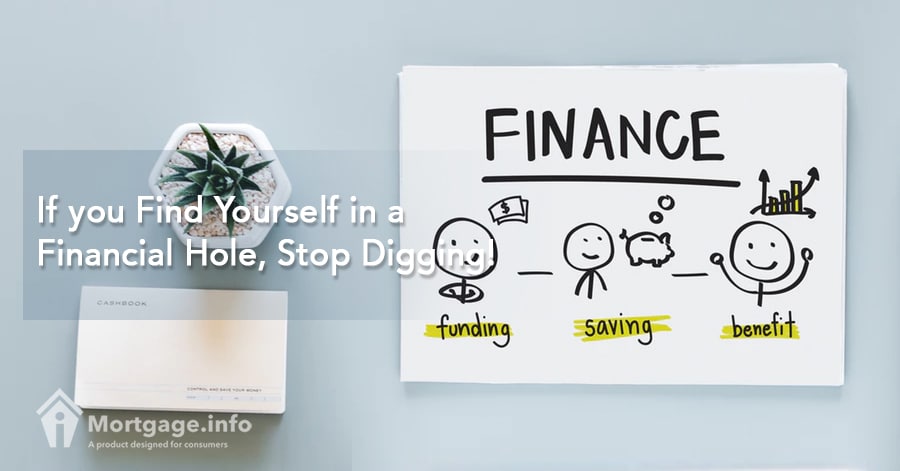
Are you in over your head in debt? Do you feel like there is no way out? You aren’t alone. But, the good news is that there is a way out and you’ve just taken the first step.
Get Matched with a Lender, Click Here.
You recognize that you are in a financial rut. Now it’s time to put an end to it. By admitting your problem, you have given yourself a head start. Now you just need to put a proven plan into motion.
Stop Taking on Debt
The very first thing you need to do is stop taking on new debt. Put a halt to any new credit applications or queries for a new loan. If you don’t have the cash for it, you don’t need it. That must be your new motto. Borrowing only puts you further into debt and is what digs you deeper into that financial hole.
When you get credit card applications in the mail, shred them. Don’t think about buying a new car or applying for a new mortgage. This includes refinancing your current mortgage or taking out a home equity line of credit. In essence, you want to freeze your credit.
Stop Using Your Credit Cards
Next, we need you to lock up your credit cards. Don’t cancel them, that may only hurt your credit score. Instead, put them somewhere, like a safe or at your parent’s house, where you won’t use them. Use the ‘out of sight, out of mind’ theory. We know you won’t forget about them right away, but with them out of your wallet, you won’t have easy access to them.
Take a Long, Hard Look at Your Spending
Now you need to take a long, hard look at your spending. Pull up the last six months of bank statements to see where your money went. Categorize each expense and then hold your breath as you total those expenses. Do some categories shock you? Don’t worry; that’s normal. It’s so easy to spend a few dollars here and there and think nothing of it. When you total up those dollars, though, it can be frightening to realize how much you actually spend.
Once you know the categories that could use some reprieve, figure out how to cut back. Whether you are a shopper, coffee drinker, frequent salon patron, or you spend your money somewhere else, think twice about it. Can you cut back on those habits? Maybe you don’t eliminate them altogether just yet, but you will want to eventually. For now, just cut down on those habits.
Get Your Accounts Current
Next, you need to focus on your current debts. Are you behind on any payments? If so, now is the time to catch up. You can’t start any of the next steps until you are current on your bills. If you stay behind, you only continue to dig that financial hole deeper and deeper. Take your time in getting caught up – there’s no sense in stressing yourself out just yet. Once they are current, you are ready for the next step – the emergency fund.
Setting up an Emergency Fund
It’s easy to live without an emergency fund when you rely on credit cards. Now that we’ve locked up your credit cards, though, it’s time to rethink your strategy. You need to set up that emergency fund. Just how much you need depends on your monthly expenses.
Click to See the Latest Mortgage Rates.
We recommend saving at least three to six months’ worth of income or expenses. This way if you face an emergency, you have money to rely on. If that’s too big for you to think about right now, start with $1,000. Make that your goal. Whether you save $5 at a time or you have a large sum of money you can sock away right away – do it. Then make it a habit to keep saving until you have several months of income put away.
Create a Budget
Now you have to create a budget. You have your emergency fund so you can fall back on it if your car needs repairs or your hot water heater stops working. What about the rest of your money, though? where is it going?
You have to pay your regular monthly bills, that’s a given. But, you also have to start working on your debt. We recommend starting with the smallest debt. Let’s say you have a credit card with a $200 balance. Start with that debt. Pay extra towards that card until it’s paid in full. Then that extra amount that you could afford to put towards that card should go towards the next card. This extra money should be in addition to the minimum monthly payment on the credit card. This way you are paying more and hitting the principal balance that you owe.
Keep it Going
Once you establish a budget and are able to pay down some debt, it’s time to keep it going. Don’t stop until you have hit all of your debt. This doesn’t mean just credit card debt. You’ll want to pay your other debts too, like your car loan, student loans, and even your mortgage.
Ultimately, you want to be debt free. This isn’t going to happen overnight. It’s not even going to happen in the next five years. But with consistent habits and an end to excessive spending on credit cards, you’ll get yourself out of that financial hole and find yourself with a bit of financial freedom.
